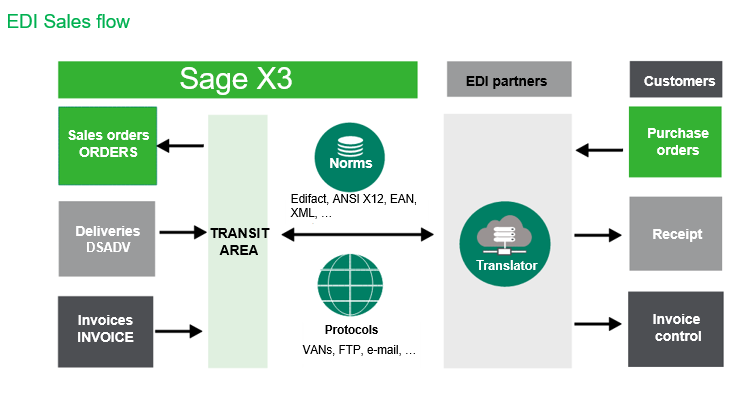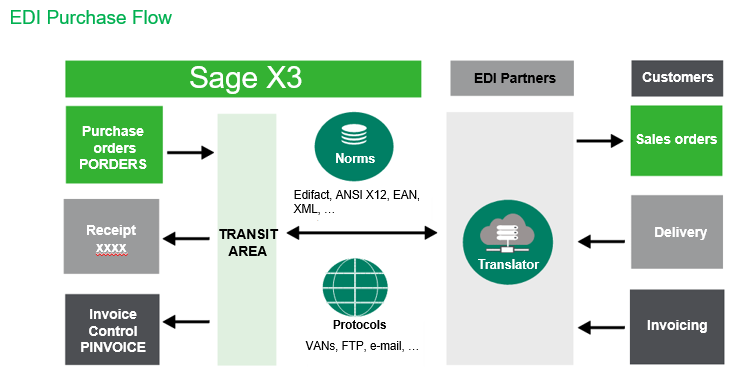EDI in Sage X3
Mapping of flows
The EDI sales flows are mapped as follows:

The EDI purchase flows relate to the purchase invoice. They are mapped as follows:

EDI integration with Sage X3
This integration allows the electronic exchanges of the sales documents managed in the application to be implemented. The implementation of the electronic exchanges is based on:
- A comprehensive setup of outbound and inbound data flows
- The use of various file formats and exchange protocols relevant to the impacted EDI partners
Sage X3 also contains operating functions specific to:
- The processing of message outbound and inbound transmission
- The tracking and traceability management of the exchanges performed
EDI setup
When using the Electronic Data Interchange functionality, several setup functions are available to meet multiple requirements:
Common setup
-
What are the document types that are supported during an exchange?
See the: EDI categories function.
-
How to perform exchanges? Which protocols are used during an exchange?
See the: EDI protocols function.
-
According to which partner’s standards are exchanges implemented?
See the: EDI partners function.
Flow definition
-
How are the various components or attributes of a message (category, Sage X3 representation, import template for receipts, etc.) defined and linked?
See the: EDI message mapping function.
-
What are the format, structure and characteristics of the files to be sent? What is the structure of the received files and how do they match the fields of the Sage X3 representation?
See the following functions: EDI sequential files and EDI XML files.
-
How to upload the XSD files containing the schema of the XML files?
See the: EDI upload XSD file function.
-
How can you wrap/create a package of EDI messages?
See the: EDI flows function.
Associations
-
How to add and link companies, sites and BP by specifying an identification number for each EDI partner?
See the following functions: EDI partner / company, EDI partner / site, EDI partner / BP.
-
How to link EDI flows with BP/companies?
See the: EDI flow by BP/company function.
EDI usage
Two aspects are considered, first, the message sending and receiving processes:
-
How to generate an EDI outbound message?
See the: EDI issues generation
-
How to receive an EDI inbound message and integrate data into Sage X3?
See the: EDI inbound message generation function.
-
How to generate the Intrastat files for the Intrastat declaration in XML format?
See the: EDI Intrastat generation function.
It also concerns the control tools:
-
How to view and save the setup of an EDI exchange?
See the: EDI setup query function.
-
How to perform a detailed tracking of the documents processed through an EDI exchange, successful or failed?
See the: EDI temporary storage function.
-
How to view the history of exchanged documents?
See the: EDI document tracking function.
